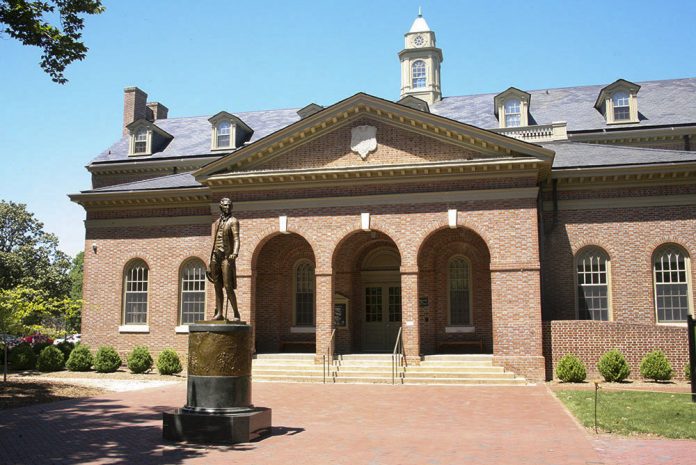Thursday, Sept. 21, the College of William and Mary’s Public Policy Program hosted Dr. Robert Spitzer in Tucker Hall for a discussion on the United States’ history with gun laws and violence. Spitzer is an adjunct professor at the College of William and Mary Law School, as well as a professor emeritus at the State University of New York College at Cortland.
Paul Manna, director of Public Policy at the College, moderated the event alongside associate teaching professor Alan Kennedy.
Spitzer began with a lecture on America’s history of gun violence and the current state of dispute over the issue.
“Disputes over gun policy today are seen as zero-sum for the two sides–gun rights and gun control,” Spitzer said. “But that’s not how gun policy has always operated over the years.”
Spitzer described how the original 13 colonies implemented a variety of gun laws.
“In many respects, guns were more strictly regulated in the first 300 years than the last 30 years,” he said. “These gun laws applied to everyone, from Native Americans to Protestants, and new owners to the experienced. Weapons were often confiscated if these laws were violated and, in many instances, if guns were fired after dark, near cemeteries and near towns.”
In the same segment, Spitzer continued reflecting on the uses and views of guns in the past decade. He referenced key court cases, such as the monumental 2008 Supreme Court decision in District of Columbia v. Heller.
“This was the first time a federal court overturned a violation of the Second Amendment, and it was an individualist view of the Second Amendment,” he said.
Then, Spitzer raised New York State Rifle and Pistol Association Inc. v. Bruen (2022).
“The case determined that the Second Amendment protects an individual’s right to a handgun outside the home,” Spitzer said. “Specifically, the case allowed for the concealed-carry of a firearm for ordinary self-defense purposes in daily, public life.”
“This case established a new history-based test for establishing gun laws,” Spitzer said. “Other amendments are not so subject to its history.”
He explained how this more recent case added a new framework for evaluating the legality of gun laws.
“This case established a new history-based test for establishing gun laws,” Spitzer said. “Other amendments are not so subject to its history.”
Ultimately, Spitzer believes the Supreme Court’s ruling in NYSRPA v. Bruen relates to constitutional originalism, the notion that judges should interpret the Constitution as its original intent from the time of its founding in the 18th century, filtering out new interpretations.
Spitzer then elaborated on his research of the fallacies of originalism as it relates to the interpretation of the Second Amendment. A gun owner himself, Spitzer said he enjoys using his rifle in a safe and controlled environment and supports increased gun legislation.
Kennedy and Spitzer then had a 30-minute moderated discussion, building upon Spitzer’s lecture. Kennedy asked Spitzer about his involvement in shaping gun policies. Spitzer shared that he has been invited to serve as an advisor to the state attorney general in drafting gun laws.
“I was asked by the state to prepare documents of old gun laws,” he said. “I treat these documents as quantitative data, even if I don’t specialize in that.”
Nearing the end of the event, the audience had the opportunity to ask Spitzer questions.
“The number one source state for guns in New York is Georgia, and it’s not a coincidence. There’s a patchwork of gun laws within the country,” he said.
One student asked Spitzer about the ramifications of stricter gun laws, citing a possible increase in gun sales on the black market. In response, Spitzer explained that law enforcement would be able to suppress illegal gun trafficking more easily with increased legislative restrictions. Kennedy also shared his view on the issue.
“The number one source state for guns in New York is Georgia, and it’s not a coincidence. There’s a patchwork of gun laws within the country,” he said.
Kennedy believes inadequate and varying legislation across the country makes the illegal sale of guns easier.
Another attendee asked Spitzer about legislating ghost guns, which are difficult to trace.
He explained that ghost guns are the parts of a gun that anyone can purchase on the internet with no serial numbers. Using these parts, people build their own guns with no serial numbers. According to Spitzer, the solution is to make sure serial numbers appear on the parts as well as the final firearm product.
“There’s nothing about serial numbers that restricts guns themselves. Any law-abiding citizen should want a serial number so that guns can be tracked,” Spitzer said.
The event followed with a reception in Chancellors Hall. Madison Scalf ’24 shared her thoughts on Spitzer’s talk.
“He seemed to really be knowledgeable of what he was talking about,” she said.
Scalf appreciated the talk as a public policy student herself.
“As someone who’s going into public policy, it gave me a lot of tools, not only when it comes to advocacy, but also when it comes to argument for certain policies and making me overall more of a passion to look at gun control laws,” Scalf said.

